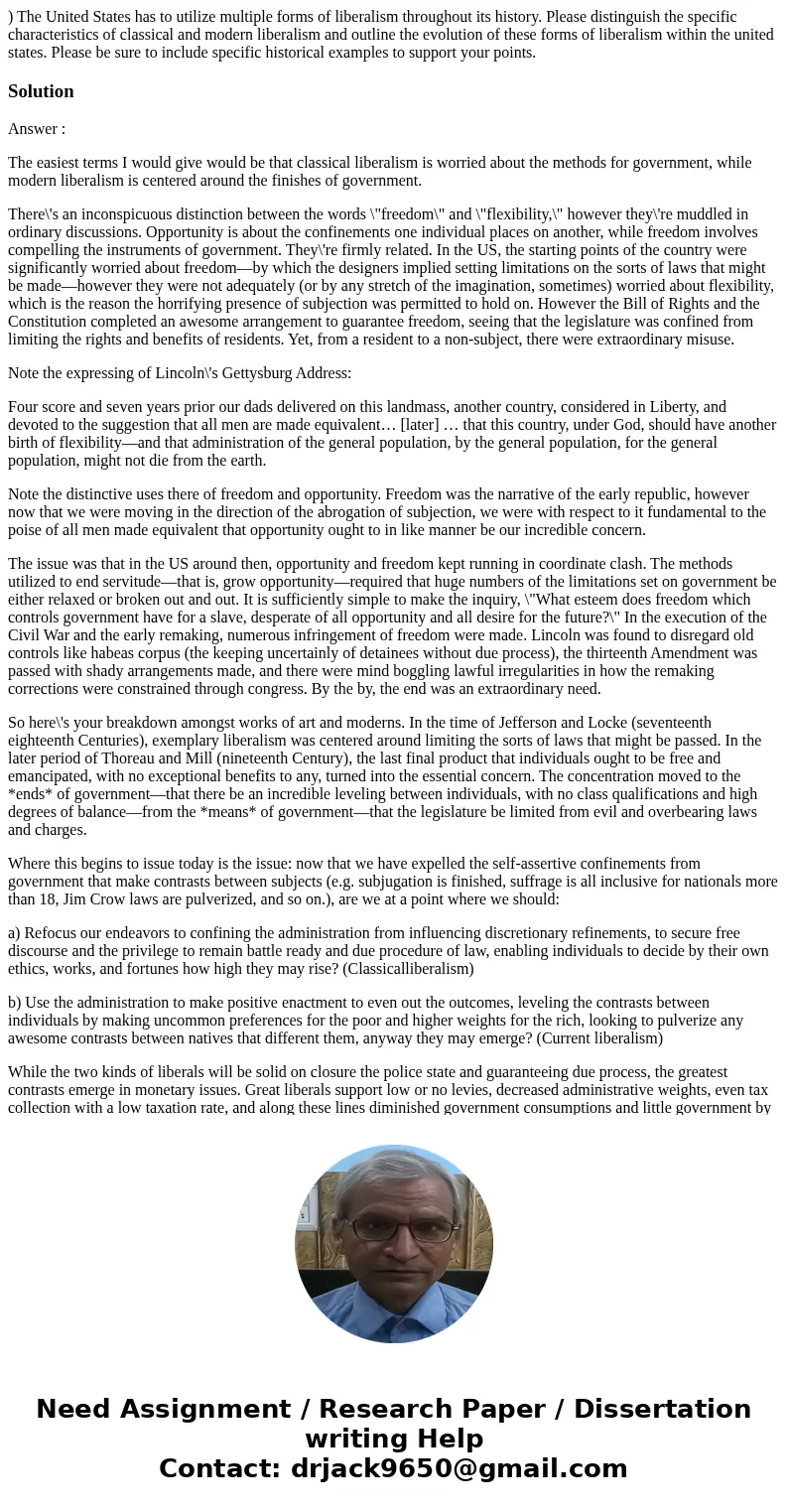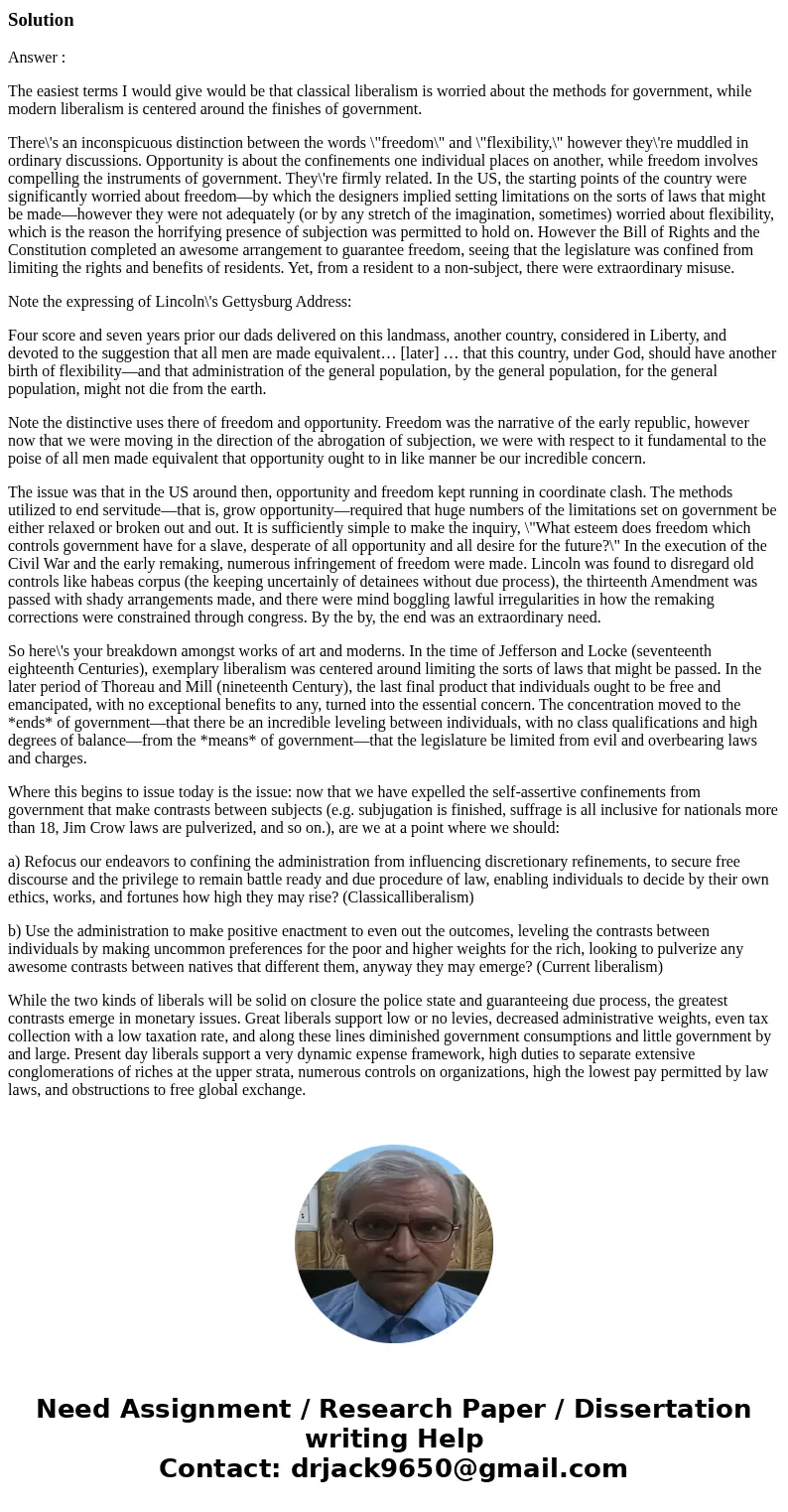The United States has to utilize multiple forms of liberali
) The United States has to utilize multiple forms of liberalism throughout its history. Please distinguish the specific characteristics of classical and modern liberalism and outline the evolution of these forms of liberalism within the united states. Please be sure to include specific historical examples to support your points.
Solution
Answer :
The easiest terms I would give would be that classical liberalism is worried about the methods for government, while modern liberalism is centered around the finishes of government.
There\'s an inconspicuous distinction between the words \"freedom\" and \"flexibility,\" however they\'re muddled in ordinary discussions. Opportunity is about the confinements one individual places on another, while freedom involves compelling the instruments of government. They\'re firmly related. In the US, the starting points of the country were significantly worried about freedom—by which the designers implied setting limitations on the sorts of laws that might be made—however they were not adequately (or by any stretch of the imagination, sometimes) worried about flexibility, which is the reason the horrifying presence of subjection was permitted to hold on. However the Bill of Rights and the Constitution completed an awesome arrangement to guarantee freedom, seeing that the legislature was confined from limiting the rights and benefits of residents. Yet, from a resident to a non-subject, there were extraordinary misuse.
Note the expressing of Lincoln\'s Gettysburg Address:
Four score and seven years prior our dads delivered on this landmass, another country, considered in Liberty, and devoted to the suggestion that all men are made equivalent… [later] … that this country, under God, should have another birth of flexibility—and that administration of the general population, by the general population, for the general population, might not die from the earth.
Note the distinctive uses there of freedom and opportunity. Freedom was the narrative of the early republic, however now that we were moving in the direction of the abrogation of subjection, we were with respect to it fundamental to the poise of all men made equivalent that opportunity ought to in like manner be our incredible concern.
The issue was that in the US around then, opportunity and freedom kept running in coordinate clash. The methods utilized to end servitude—that is, grow opportunity—required that huge numbers of the limitations set on government be either relaxed or broken out and out. It is sufficiently simple to make the inquiry, \"What esteem does freedom which controls government have for a slave, desperate of all opportunity and all desire for the future?\" In the execution of the Civil War and the early remaking, numerous infringement of freedom were made. Lincoln was found to disregard old controls like habeas corpus (the keeping uncertainly of detainees without due process), the thirteenth Amendment was passed with shady arrangements made, and there were mind boggling lawful irregularities in how the remaking corrections were constrained through congress. By the by, the end was an extraordinary need.
So here\'s your breakdown amongst works of art and moderns. In the time of Jefferson and Locke (seventeenth eighteenth Centuries), exemplary liberalism was centered around limiting the sorts of laws that might be passed. In the later period of Thoreau and Mill (nineteenth Century), the last final product that individuals ought to be free and emancipated, with no exceptional benefits to any, turned into the essential concern. The concentration moved to the *ends* of government—that there be an incredible leveling between individuals, with no class qualifications and high degrees of balance—from the *means* of government—that the legislature be limited from evil and overbearing laws and charges.
Where this begins to issue today is the issue: now that we have expelled the self-assertive confinements from government that make contrasts between subjects (e.g. subjugation is finished, suffrage is all inclusive for nationals more than 18, Jim Crow laws are pulverized, and so on.), are we at a point where we should:
a) Refocus our endeavors to confining the administration from influencing discretionary refinements, to secure free discourse and the privilege to remain battle ready and due procedure of law, enabling individuals to decide by their own ethics, works, and fortunes how high they may rise? (Classicalliberalism)
b) Use the administration to make positive enactment to even out the outcomes, leveling the contrasts between individuals by making uncommon preferences for the poor and higher weights for the rich, looking to pulverize any awesome contrasts between natives that different them, anyway they may emerge? (Current liberalism)
While the two kinds of liberals will be solid on closure the police state and guaranteeing due process, the greatest contrasts emerge in monetary issues. Great liberals support low or no levies, decreased administrative weights, even tax collection with a low taxation rate, and along these lines diminished government consumptions and little government by and large. Present day liberals support a very dynamic expense framework, high duties to separate extensive conglomerations of riches at the upper strata, numerous controls on organizations, high the lowest pay permitted by law laws, and obstructions to free global exchange.


 Homework Sourse
Homework Sourse